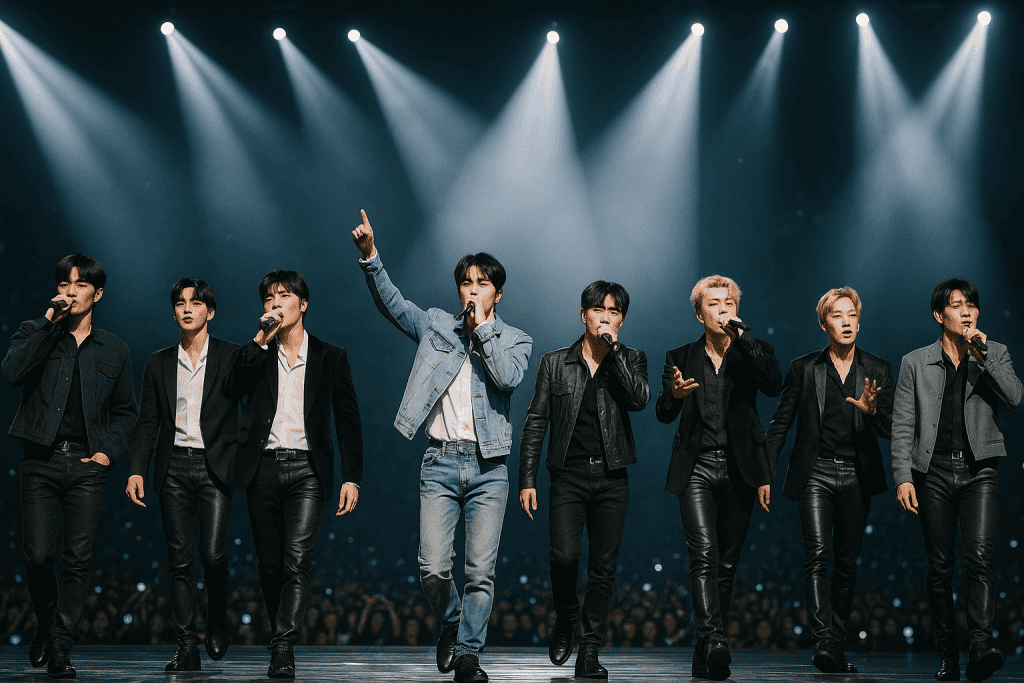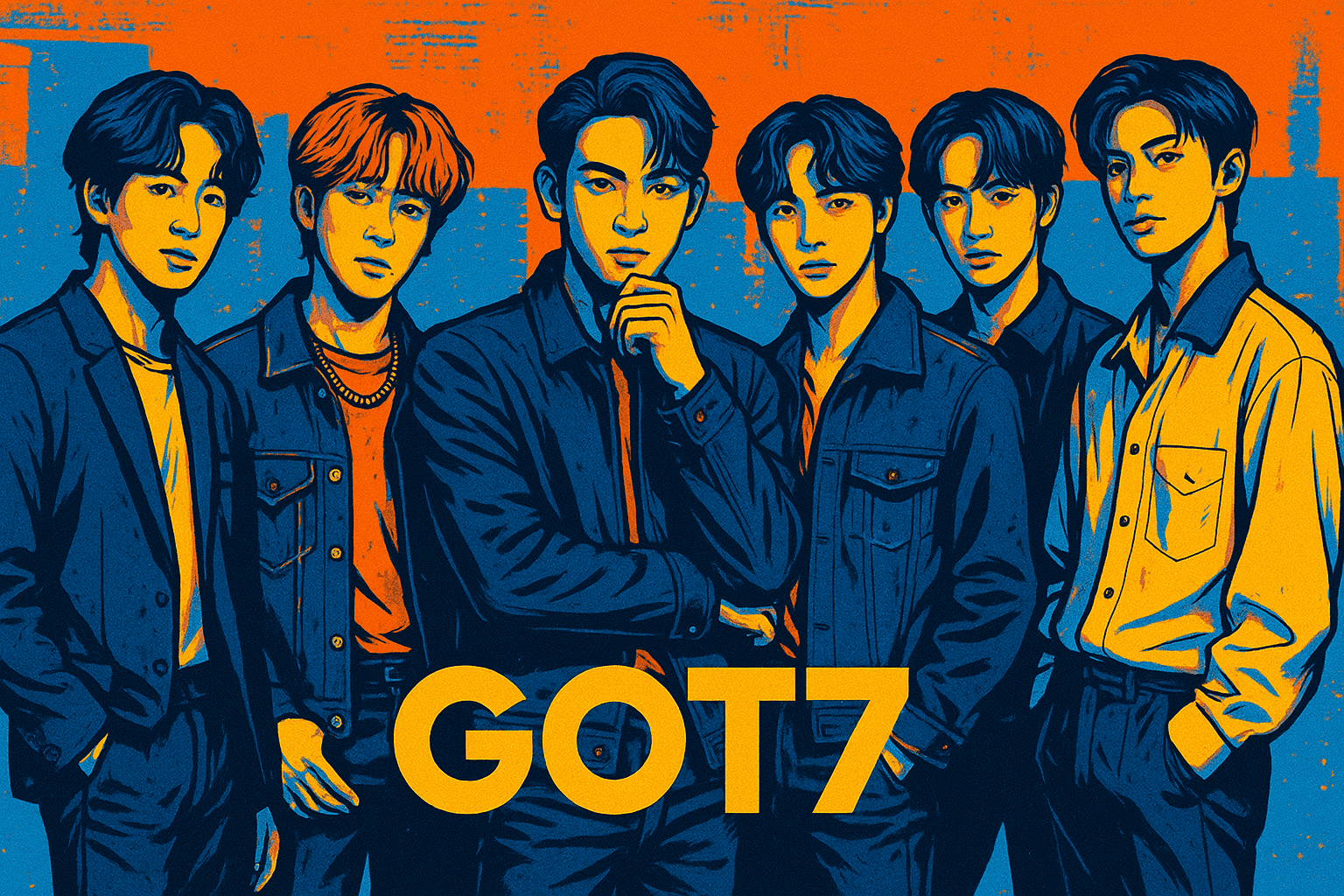GOT7 members are one of the enduring names in K-pop. Debuting on January 16, 2014 under JYP Entertainment, the group introduced themselves with the EP Got It?. The seven members—Jay B, Mark, Jackson, Jinyoung, Youngjae, BamBam, and Yugyeom—quickly captured attention for dynamic performances and a multinational lineup.
This blog explores GOT7’s members, their solo and group paths, and their cultural impact. It is an important topic because GOT7’s career reflects what long-term success looks like in K-pop. Many groups disband after contracts expire. GOT7, however, showed loyalty to each other and their fandom, I GOT7 (Ahgase). Their balance of solo careers and group comebacks provides insight into how idols adapt to evolving industry demands.

GOT7 members & Multinational Identity
One reason for GOT7’s appeal is their diversity. The lineup includes members from Korea, Hong Kong, Thailand, and the United States. Consequently, this gave them broad international attention from the very start. From their earliest promotions, GOT7 emphasized a global identity, which helped them appeal to fans across Asia, the West, and beyond. Furthermore, their fluency in multiple languages—Korean, English, Thai, and Mandarin—allowed them to connect personally with international fans at tours, showcases, and interviews.
Jay B, the leader, anchors the group with authority and strong vocals. Meanwhile, Mark and Jackson deliver rap charisma, while BamBam contributes unmatched style and energy. In addition, Jinyoung and Youngjae bring vocal strength and emotional depth. Finally, Yugyeom, as the main dancer, adds fluid movement and youthful energy. Together, they embody a multinational identity that reflects K-pop’s global ambitions.
Their performances also highlight this diversity. Initially, GOT7 became known for martial arts tricking—a combination of flips and acrobatics integrated into choreography—which immediately set them apart. As they matured, however, their stages shifted toward sleek contemporary dance and narrative-driven visuals. Beyond music shows, variety programs, and fan meetings, the members’ willingness to share personal stories gave fans a sense of intimacy. Therefore, this blend of artistry, cultural diversity, and approachable personality has remained one of their strongest appeals.
Recent Changes & Solo Projects of GOT7 Members
In January 2021, GOT7’s contracts with JYP Entertainment expired. All members chose not to renew. Instead of disbanding, they affirmed the group would continue. This reassured fans and showed loyalty. Their decision was widely praised in the K-pop industry, as it demonstrated how idols can retain autonomy while maintaining group identity.
The group later signed with Warner Music Korea. In May 2022, they released the self-titled EP GOT7, marking a new era. This comeback proved they could thrive independently of their original agency. The mini-album featured tracks written and produced by members themselves, which showcased their growth as artists. It was well received by critics and fans, topping charts domestically and internationally.
Meanwhile, members pursued solo paths. Jackson promoted music internationally and launched his brand Team Wang, balancing K-pop fame with global collaborations. BamBam built a solo career in Thailand and Korea, gaining recognition for his witty personality on variety shows. Youngjae and Jay B released solo albums that highlighted their vocal and R&B styles. Jinyoung focused on acting, securing lead roles in dramas and films, while Yugyeom signed with AOMG, showing dance and R&B talent. Mark expanded activities in the US, releasing English-language singles and engaging with Western fans. These projects didn’t just diversify their careers—they strengthened GOT7’s overall profile by spreading influence across multiple industries.
Artistic Evolution & Fan Engagement
GOT7’s music has evolved with maturity. Early songs like Girls Girls Girls and Just Right expressed youthful charm. Later hits such as Hard Carry and You Calling My Name highlighted polished production and deeper emotions.
Their live shows also became a signature. Known for high-energy choreography and interactive fan service, GOT7 built a reputation for engaging stages. Fans value their humor and sincerity as much as their music.
Even with solo activities, they maintain strong ties with Ahgase. Social media, YouTube content, and fan events keep the bond alive. Their 2022 comeback, though brief, reminded fans of their group chemistry. GOT7’s adaptability ensures their fandom stays engaged.
This balance of group and individual efforts allows GOT7 to continue thriving while exploring personal growth. It is a formula few groups achieve successfully.
Here’s one of their Official MV for ‘PYTHON’:
Analysis or Opinion
GOT7’s journey shows what resilience looks like in K-pop. Many groups dissolve after leaving their original agency. GOT7 proved that unity and fan loyalty can sustain a group. Their decision to remain together while pursuing individual careers set an important precedent.
Artistically, their growth is commendable. From playful tracks to complex concepts, their discography reflects a range of styles. Songs like If You Do and You Calling My Name demonstrate maturity, while solo projects expand their reach into genres like R&B, EDM, and pop.
One challenge they face is visibility as a group. With members pursuing busy solo careers, fans worry about fewer group activities. Yet, their 2022 comeback proved they could reunite when timing allowed. Their ability to maintain group identity amid solo work is impressive.
Culturally, GOT7’s impact extends beyond music. They represent global K-pop, blending nationalities and languages to connect with diverse audiences. Their humor, sincerity, and artistry created a unique bond with fans. For younger groups, GOT7’s model shows survival and growth beyond a single label.
In my opinion, GOT7 deserves recognition not only for their music but also for their loyalty and adaptability. Their story reflects strength, creativity, and what true teamwork in K-pop can look like.
Conclusion
GOT7 members—Jay B, Mark, Jackson, Jinyoung, Youngjae, BamBam, and Yugyeom—embody creativity, loyalty, and resilience. Their multinational identity set them apart early, and their artistry has only deepened with time.
Though contract changes introduced uncertainty, they proved their commitment to each other and their fandom. Their return under Warner Music Korea and continued solo projects highlight flexibility and dedication.
For longtime fans, GOT7 remains a source of pride. For new listeners, exploring their group songs alongside solo work offers a complete picture. GOT7’s legacy proves that unity, artistry, and adaptability are key to lasting success in K-pop.
FAQ
Who are GOT7’s members and when did they debut?
GOT7 debuted on January 16, 2014 under JYP Entertainment with the EP Got It?. The seven members are Jay B, Mark, Jackson, Jinyoung, Youngjae, BamBam, and Yugyeom.
Did GOT7 disband after leaving JYP in 2021?
No. Although all members chose not to renew with JYP in January 2021, they stated the group would continue. In May 2022, they released the self-titled EP GOT7 under Warner Music Korea, confirming ongoing group activity.
What solo activities are GOT7 members pursuing?
Jackson (Team Wang) promotes globally; BamBam is active in Korea/Thailand and variety; Jay B and Youngjae release R&B-leaning solo music; Jinyoung focuses on acting; Yugyeom joined AOMG for R&B/dance projects; Mark develops music and content in the U.S.
What defines GOT7’s artistic evolution and fan engagement?
They shifted from acrobatic tricking to refined contemporary stages and mature tracks like “You Calling My Name.” Even with solo schedules, they engage Ahgase through socials, YouTube, fan events, and periodic group comebacks to keep the bond strong.
Resources
- KpopAZ- GOT7 Members Profile and Facts
- KPopping – GOT7 Members
- Idol Insights – GOT7 Member Info
- TeenVogue – Jackson & BamBam at LV F/W 2025
- Billboard – GOT7’s Global Music Achievements

